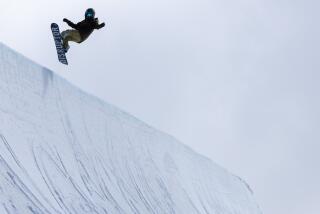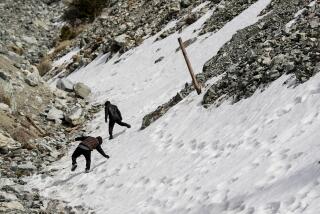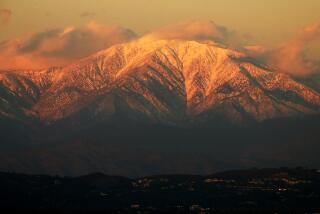Skiers Cool to Advice on Helmets
- Share via
Wearing a helmet doesn’t seem to rankle as many motorcyclists as it did a decade ago, and the sight of children on bikes in protective headgear never seemed to raise much of a fuss.
But the thought of wearing a helmet while navigating the soft pack on a mountain slope is giving most avid skiers the shivers.
A year after Rep. Sonny Bono (R-California) died of head and neck injuries in a skiing accident, the Consumer Product Safety Commission is recommending that skiers and snowboarders wear helmets to reduce injuries and save lives.
It’s not what Jerry McGhee, a 20-year skier who was shopping for poles recently at a Sport Chalet in La Canada, wants to hear.
“I wouldn’t wear it,” said McGhee, a special education teacher. “Most accidents, especially head injuries, happen when you are skiing out of bounds between trees or doing risky things”--as was Bono, who crashed into a tree. “That’s not me.”
Mandatory helmet requirements would be the province of individual states, none of which have such laws.
In making its recommendation, the federal panel said 17,500 people suffered head injuries from skiing and snowboarding in 1997, and estimated that helmets would have reduced the severity of injuries among 44% of adults and 53% of children under 15. The study also claimed helmets would have prevented 11 deaths.
“There is not much usage right now, but we hope that more and more people will wear them, and parents will [set an example] for their children,” said Ken Giles, a commission spokesman.
Veronica Williams and her friend, Trina Young, didn’t know about the helmet recommendation until a reporter told them about it outside a Marina del Rey ski shop.
But the issue had been on Williams’ mind for a year, since the skiing deaths last January of both Bono and Michael Kennedy, the 39-year-old son of the late Sen. Robert F. Kennedy, who smashed into a tree a week before Bono did.
“I fall down a lot when I ski, so I’ve thought about wearing a helmet,” Williams said.
“Yeah, but where do you fall?” interrupted a skeptical Young, who saw no need for the safety gear. “Not on your head.”
Industry trade organizations oppose any effort to make helmet use mandatory, but applauded the study’s findings.
“I think suggesting people use helmets is a good thing,” said David Ingemie, president of Snowsport Industries America, a nonprofit trade association representing 1,000 manufacturers and suppliers of ski products.
Ingemie, citing figures showing that skiers have become more safety-conscious of late, said nearly a quarter-million helmets were sold last year, representing a 267% increase in sales since the 1995-96 ski season. Still, with nearly 10 million people skiing, last year’s helmet-buyers accounted for only a small fraction.
The National Ski Areas Assn., the trade group representing ski area owners and operators across the country, said skiers and boarders should consider wearing helmets as one of many safety considerations.
“We don’t view helmets as a panacea for addressing the safety concerns on the slopes,” said Michael Berry, the association’s president. “The decision to wear a helmet is, and should be, a matter of personal choice.”
He said studies show that helmets are not going to be of much help for skiers traveling over 12 mph. “A helmet probably is not going to be of much help in a direct impact with a solid, fixed object--such as a tree,” he said. “Skiers and boarders generally ski between 25 and 40 mph--often even faster.”
More importantly, he said, skiers should follow a code of responsible conduct which emphasizes skiing under control and at a speed that allows them to stop or avoid other people or objects.
Ed Berlinger, a 33-year-old cable installer who was shopping in the La Canada ski store, said he smacked his head hard once while snowboarding and probably could have used a helmet that time.
“But I wouldn’t be happy with any law requiring me to wear one,” he said. “I’d protest it just like the motorcycle helmet law” approved by the California Legislature over emotional opposition from some motorcyclists in 1991. “Government shouldn’t make those kinds of decisions.”
Jerry McGhee, like most skiers, can recall moments when he probably took more risks than he should have. But he’s not sure a helmet would have helped.
“Once I almost lost my life,” he said. “I was skiing and my goggles fogged over and the next thing I knew I almost went over a cliff. Two days earlier, someone died at the same location.
“There is just a risk that you take whenever you ski.”
More to Read
Sign up for Essential California
The most important California stories and recommendations in your inbox every morning.
You may occasionally receive promotional content from the Los Angeles Times.










